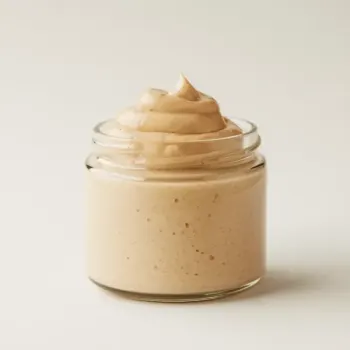Soy milk is a light, nutty-flavored dairy alternative, suitable for drinks and light sauces. Cashew cream is a thick, slightly sweet substitute for heavy cream or cheese in richer dishes. They're not universally interchangeable in cooking due to their distinct textures and flavors.

Soy milk is a plant-based beverage made from soybeans. It's a versatile and widely used dairy alternative known for its light texture and subtle nutty flavor.

Cashew cream is a rich, creamy concoction made from blended cashews. Often used as a dairy substitute in recipes, it's celebrated for its smooth texture and neutral, slightly sweet taste.
The primary differences lie in consistency, taste, and versatility. Soy milk is thinner and lighter, making it suitable for drinks and light sauces. Cashew cream, with its thick, rich texture, serves as a heavy cream or cheese substitute. Soy milk has a more pronounced nutty flavor, while cashew cream is milder and sweeter. Additionally, soy milk is made from a legume, whereas cashew cream is derived from tree nuts.

Your ultimate Recipe Box, Meal Planner, and Cooking Class all in one
Soy Milk is often chosen to lighten coffee and tea without overpowering the beverage's flavor. Expect a smooth integration with a slight nutty backdrop. Cashew Cream can be used to add a rich, luxurious texture to coffee and tea, though it may require more blending to achieve a homogeneous mixture.
In soups and sauces, soy milk offers a light creaminess without adding heaviness. It's ideal for bisques and creamy dressings. Use cashew cream for a thicker, more velvety texture in dishes like vegan alfredo sauce or cream-based soups. It imparts a richness that's closer to dairy cream.
Soy milk is a great all-purpose dairy substitute in baking. Use it for cakes, muffins, and bread for moisture without altering the structure. In baking, cashew cream is best for creating dense, moist textures. It's excellent for cheesecakes and creamy desserts.
Opt for soy milk in smoothies, cereal, or oatmeal for a light, nutritious start to your day. Cashew cream can be dolloped onto pancakes or waffles, or stirred into oatmeal for a touch of indulgence.
Both soy milk and cashew cream are lactose-free and offer different nutritional benefits suitable for various dietary preferences.
| Nutrient | Soy Milk ( per 100ml ) | Cashew Cream ( per 100ml ) |
|---|---|---|
| Fat | 1.8g | 24g |
| Sodium | 51mg | 12mg |
| Calcium | 25mg | 2mg |
| Protein | 3.3g | 5g |
| Calories | 54 | 260 |
| Carbohydrates | 6.3g | 12g |
Yes, soy milk can be used as a substitute for cashew cream in many vegan recipes, especially if you're looking for a lighter texture and less richness.
Healthiness is subjective and depends on individual dietary needs. Cashew cream is higher in fat and calories, while soy milk is lighter and often fortified with vitamins and minerals.
Soy milk can curdle in coffee due to temperature and acidity, but this is less likely with quality brands and proper technique.
Yes, by adding more water to your cashew cream, you can achieve a consistency similar to soy milk.
While they can be substituted for each other in some cases, they are not universally interchangeable due to differences in fat content, consistency, and flavor profiles.